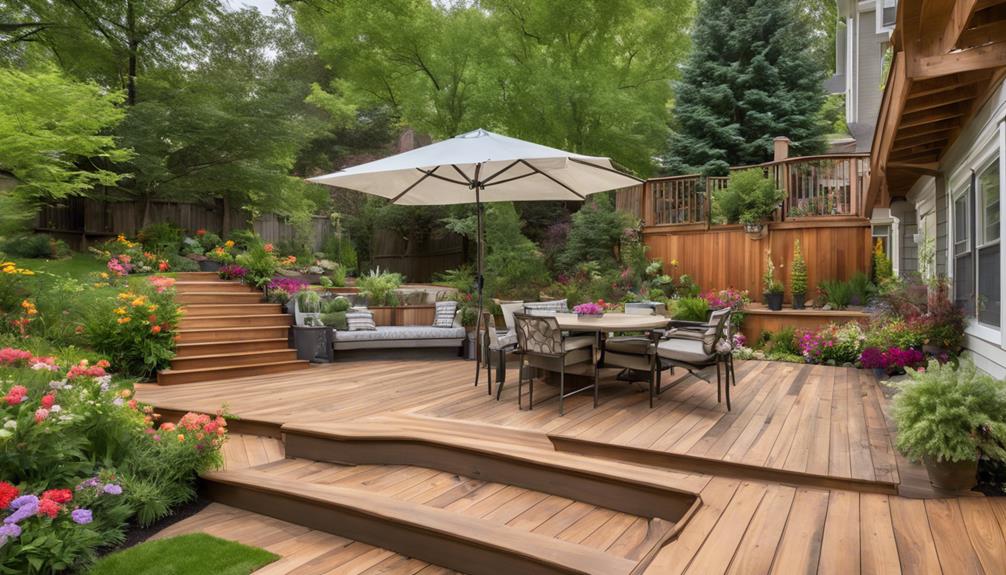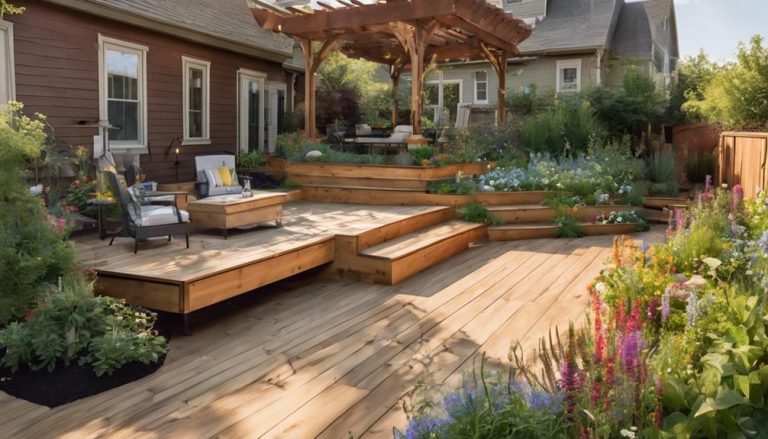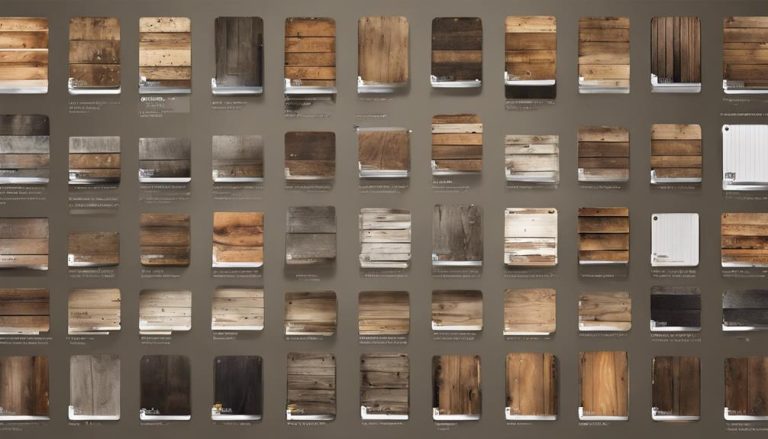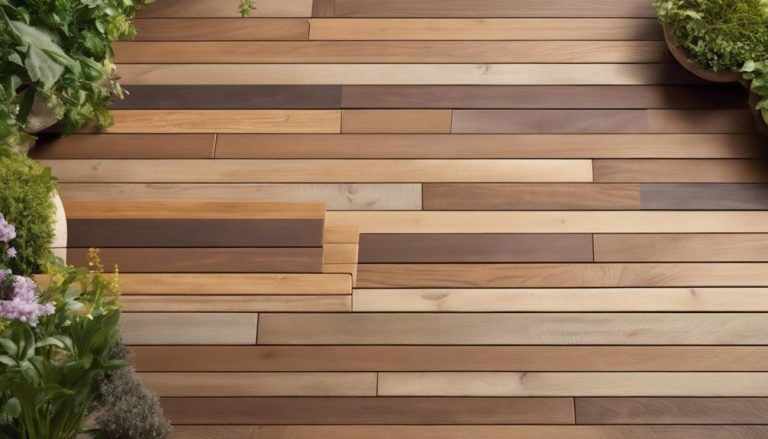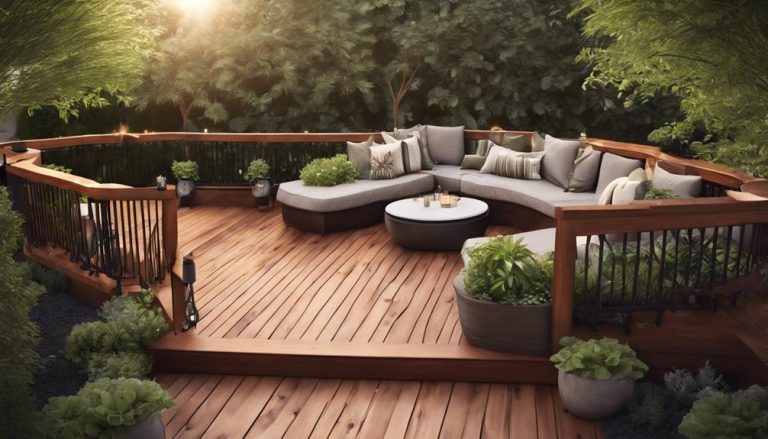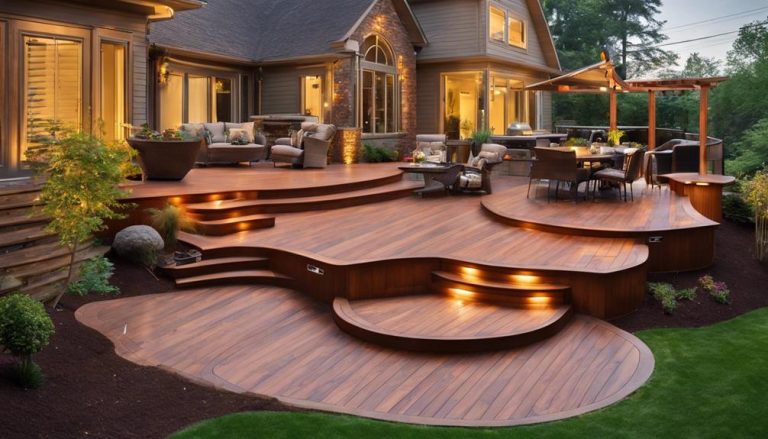What Are the Benefits of Custom Deck Designs
Custom deck designs provide remarkable advantages by enabling homeowners to manifest their unique style through a variety of materials and intricate design elements, thereby enhancing the property's aesthetic appeal and value. These tailored solutions leverage precise measurements to optimally utilize available space, integrating seamlessly with diverse landscapes and architectural features. By incorporating personalized elements such as dining areas or built-in seating, these decks create functional outdoor living spaces that enhance lifestyle appeal and elevate residential character. In addition, judicious selections in weather-resistant materials guarantee long-term durability, minimizing maintenance costs while providing enduring beauty. A deeper exploration reveals the multitude of design possibilities available.
Deck Builder Highlights
- Custom deck designs enhance property value by blending indoor and outdoor spaces and appealing to potential buyers.
- Tailored decks optimize outdoor living with personalized features like seating, outdoor kitchens, and strategic zoning.
- Unique material choices in custom designs ensure durability, aesthetics, and weather resistance.
- Custom decks offer precise sizing solutions to fit distinct contours, enhancing the overall outdoor living experience.
- Personalized design elements transform ordinary spaces, reflecting the homeowner's aesthetic while ensuring high-quality craftsmanship.
Defining Custom Deck Designs
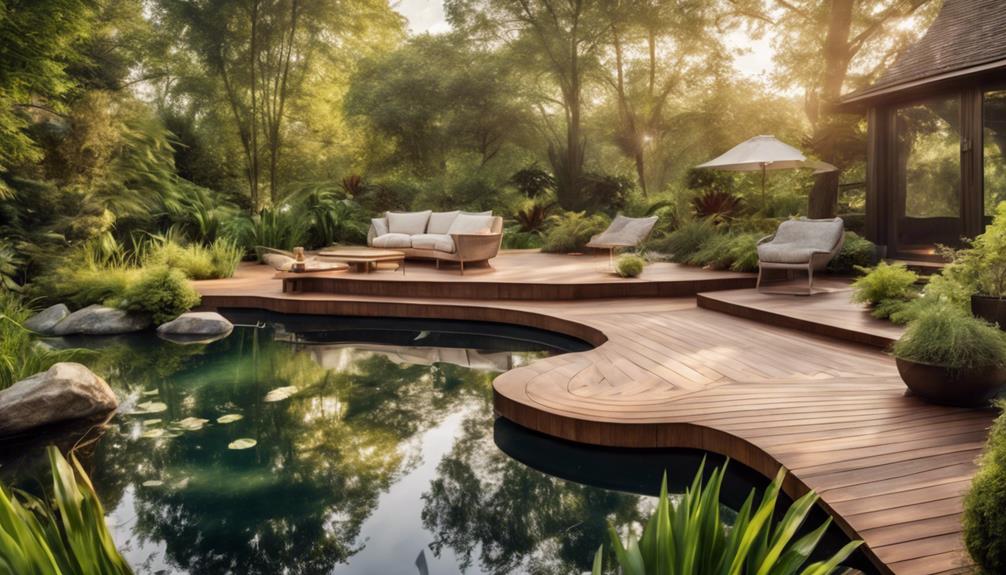
Custom deck designs present a wealth of possibilities, encompassing an array of unique style options that allow homeowners to express their personal tastes and elevate the aesthetic appeal of their outdoor spaces. With tailored size solutions, each deck plan can be adjusted to accommodate the specific dimensions and functional requirements of the property, ensuring ideal use of available space.
Additionally, collaboration with designers facilitates the seamless integration of the deck into the overall landscape, creating a harmonious outdoor living space. Personalized material choices enable individuals to select the optimal combination of durability, maintenance, and visual appeal, thereby crafting a decking solution that aligns perfectly with their lifestyle and environmental considerations.
Unique Style Options
How does a standard deck transform into a personalized oasis? The answer lies in the array of unique style options available through custom deck designs. Customization begins with the materials utilized, ranging from traditional wood to modern composites, which not only influence the aesthetic appeal but also impact the deck's longevity and maintenance requirements.
Homeowners can select from a variety of wood stains or composite colors to harmonize with their home's exterior palette, achieving either a seamless look or an eye-catching contrast.
Beyond materials, customization extends to intricate design elements such as railings, balusters, and stairs, which bring individuality to the surface. Handcrafted railings adorned with custom metalwork or glass inserts can serve as focal points, while uniquely patterned decking layouts, such as herringbone or diagonal installations, add depth and visual interest.
In addition, incorporating built-in seating, planters, or integrated lighting provides both functionality and personalization.
Each decision within a custom deck design plays a crucial role in tailoring the aesthetic and functional components to meet a homeowner's specific vision and lifestyle needs. Fundamentally, custom decks offer an opportunity to create a distinctive outdoor space that truly reflects individual style and enhances residential enjoyment.
Tailored Size Solutions
Every homeowner's outdoor space is unique, and tailored size solutions are essential in defining custom deck designs that maximize usability and comfort. Through precise measurement and innovative planning, custom deck designs cater to the distinct contours and dimensions of each space, ensuring a seamless fit that embodies both aesthetic beauty and functional excellence. The concept of tailored size solutions goes beyond mere adaptation to available space; it encompasses the strategic utilization of every inch, fostering an enhanced outdoor living experience.
Professionally designed custom decks address specific spatial configurations, be it an expansive backyard or a compact urban lot. The process begins with a detailed assessment of the area, taking into account existing landscapes, architectural styles, and intended usage. By doing so, homeowners can achieve a balanced integration of the deck with their home, ensuring that both natural harmony and architectural cohesion are maintained.
Moreover, tailored size solutions allow for the incorporation of various elements such as dining areas, lounging spaces, and even outdoor kitchens, each proportioned to fit seamlessly within the designated area. This approach not only optimizes space utilization but also enriches the quality of outdoor life, providing a personalized and practical retreat suitable for any lifestyle.
Personalized Material Choices
Building on the importance of tailored size solutions in custom deck designs, the choice of materials plays a significant role in achieving both aesthetic appeal and long-term functionality. Personalized material choices grant homeowners the ability to harmonize their deck with existing architectural features, landscapes, and individual tastes, ensuring a seamless integration with the rest of the property.
Selecting materials such as hardwood, composite, or even sustainably sourced resources allows for a diverse array of textures and colors that can either complement or contrast the home's exterior, catering to specific stylistic preferences.
Moreover, these materials can be chosen based on their durability and maintenance requirements, impacting the deck's longevity and upkeep. For instance, hardwood offers timeless elegance and strength, though it may require regular sealing to withstand weather elements. Alternatively, composite materials offer robustness with minimal maintenance, while recycled materials present an ecologically conscious choice, aligning with sustainable practices.
Different materials can also influence other aspects of a deck's usability, such as safety, comfort, and resilience. By prioritizing personalized material selections, custom deck designs can better meet an individual's functional needs and aesthetic desires, ultimately enhancing the value and enjoyment of outdoor living spaces.
Benefits
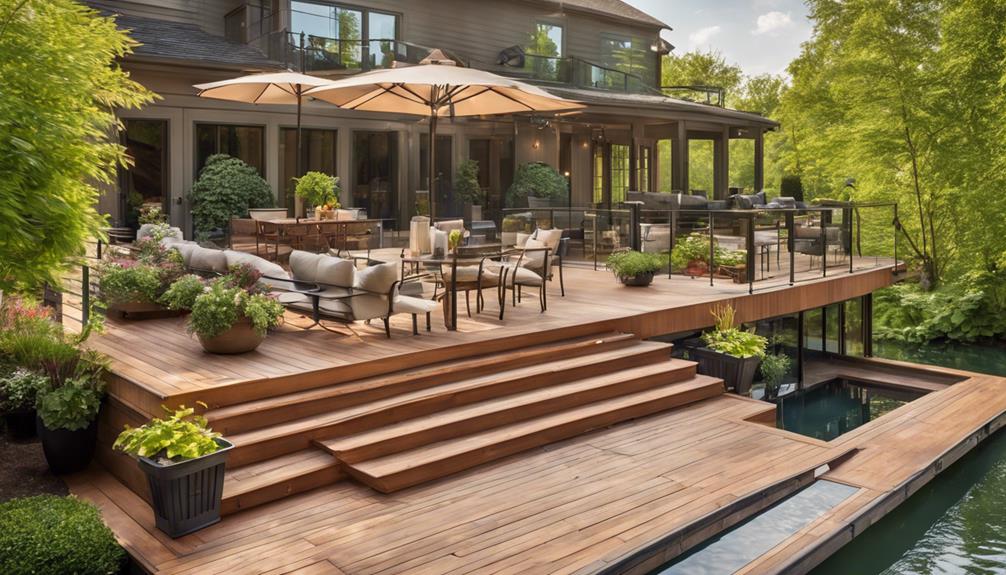
Custom deck designs offer a multitude of advantages that enhance both the aesthetic and functional aspects of outdoor living spaces, primarily through the tailored integration of unique material options and personalized layouts. These bespoke configurations not only elevate the visual appeal by harmonizing with the existing architecture but also enhance functionality by making the deck a seamless extension of the living space.
They serve as an extension of the homeowner's personal style and practical needs. Additionally, such individualized design approaches have the potential to substantially increase property value, presenting an attractive proposition for homeowners seeking a long-term investment in their property's outdoor environment.
Enhanced Aesthetic Appeal
A well-designed deck can markedly enhance the aesthetic appeal of a home, transforming an ordinary outdoor space into a stunning architectural feature. When crafted with precision and attention to detail, custom decks do more than just serve a practical purpose; they contribute to the visual identity and character of a residence.
Innovative use of materials, finishes, and design elements can make a custom deck stand out, ensuring that it harmonizes with the natural surroundings while reflecting contemporary design sensibilities.
High-quality materials such as exotic hardwoods, composite decking, and specialist metal railings not only promise durability but also deliver an elegant finish that resonates with modern taste. Elements such as built-in lighting, sleek glass panel railings, and meticulously designed steps can merge seamlessly with existing landscaping, further elevating the home's overall appearance. Additionally, the choice of design can cater to the architectural style of a house—whether traditional, modern, or rustic—ensuring a cohesive look.
In addition, customization offers the flexibility to incorporate unique design touches that resonate with the homeowner's personal aesthetic preferences, reinforcing the notion that the outdoors can be as stylistically refined as any interior space. Consequently, a custom deck becomes an extension of a homeowner's stylistic vision.
Personalized Functional Spaces
How does a custom deck transform an ordinary outdoor area into a personalized functional space tailored to individual needs and lifestyles? The design of a custom deck is much more than the selection of materials and aesthetics; it is about creating a space that aligns perfectly with the homeowner's way of living.
A customized deck facilitates intentional zoning, which can cater to various purposes such as dining, entertaining, or relaxation. Homeowners can incorporate multiple features like built-in seating, outdoor kitchens, or fire pits, turning a simple outdoor area into a versatile living space that reflects personal preferences and enhances functionality.
Furthermore, custom deck designs offer flexibility in accommodating specific needs, such as accessibility features for individuals with mobility challenges, thereby ensuring that the space is inclusive and practical for all users. They allow for creative layouts that maximize space utility, making even small decks feel expansive and inviting.
A carefully tailored deck can integrate seamlessly with the surrounding environment, considering factors like sunlight exposure and wind direction. Features like pergolas or strategic lighting can be customized to enhance comfort and ambience. In essence, personalized functional spaces facilitate tailored experiences that seamlessly blend outdoor beauty with indoor comfort and usability.
Increased Property Value
Investing in a custom deck design can considerably boost a property's market appeal and overall value. In the world of real estate, first impressions are paramount, and a well-crafted, unique deck serves as an inviting feature that attracts potential buyers. Custom deck designs are not only visually appealing but also demonstrate attention to detail and a commitment to high-quality craftsmanship—traits that buyers find immensely desirable. This added curb appeal ultimately translates into a higher market valuation, making the property more competitive in the real estate marketplace.
Moreover, a custom deck expands the usable living space, effectively enhancing the property's functionality and allure. By seamlessly blending indoor and outdoor environments, a deck offers homeowners the opportunity to extend their living area, creating a versatile space for entertainment, relaxation, or dining. Such expansions are highly coveted, particularly in regions where outdoor living is prized, accentuating the home's versatility and adaptability to various lifestyles.
In addition, expert design tailored to the property's architectural style ensures that the deck complements and augments the overall aesthetic, increasing the perceived value. The resulting harmony between the deck and the main structure resonates with potential buyers, fostering higher market demand and promising a rewarding investment return.
Unique Material Options
Custom deck designs offer a multitude of unique material options, each with distinct benefits that cater to diverse homeowner preferences and climates. By selecting materials that are not only aesthetic but also functional, homeowners can enhance the longevity and appeal of their outdoor spaces.
Wood, a classic choice, provides a natural warmth and robustness, with varieties ranging from cedar, valued for its resistance to decay, to exotic hardwoods like ipe, known for its exceptional durability. These options are well-suited to traditional aesthetics and offer a personalized touch through stains and finishes.
Alternatively, composite materials have risen in popularity due to their low maintenance and environmental sustainability. Made from recycled wood fibers and plastic, these materials resist weathering, rot, and insects, and can mimic the appearance of wood while offering a broader palette of color choices.
Additionally, modern advances have brought forth ultra-modern options like aluminum, prized for its lightweight and corrosion-resistant properties, ideal for coastal applications requiring enhanced resilience against salty air.
Each material holds specific advantages, allowing homeowners to customize their deck designs to suit specific environmental conditions, maintenance preferences, and stylistic inclinations, ultimately creating a truly bespoke and enduring addition to their home.
Material Options and Durability
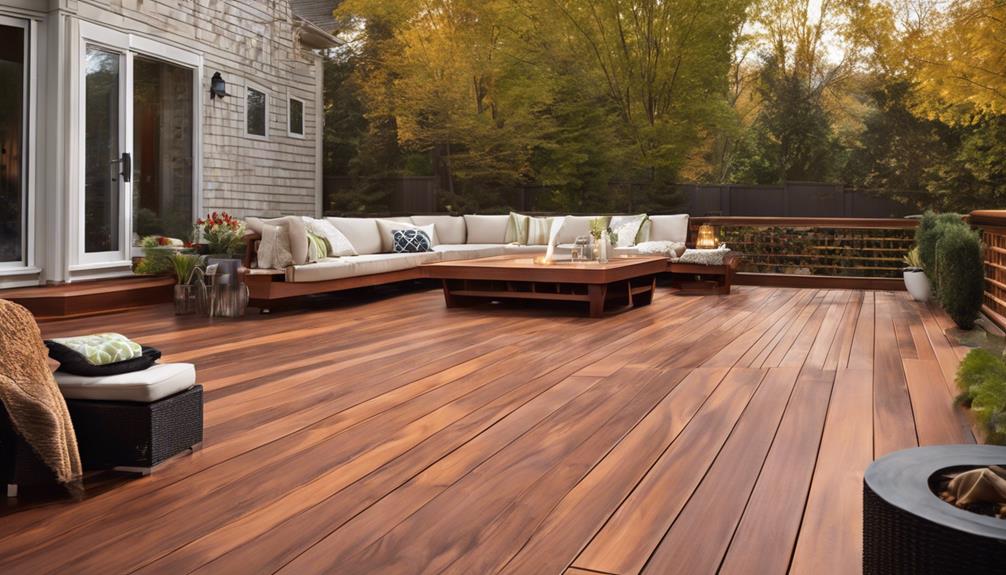
When considering custom deck designs, the selection of materials plays a pivotal role in determining both the aesthetic appeal and longevity of the structure, offering a wide range of options from traditional woods to advanced composite materials, each with unique benefits and challenges. The pursuit of long-lasting solutions is complemented by the integration of weather-resistant design choices, which are essential in enhancing durability against environmental stresses. To aid in understanding the various materials and their characteristics, the following table provides a detailed comparison:
| Material Type | Durability Level | Weather Resistance |
|---|---|---|
| Pressure-treated wood | Moderate | Moderate |
| Cedar | High | High |
| Composite | Very High | Very High |
| Vinyl | High | Very High |
| Aluminum | Very High | High |
Variety of Deck Materials
Choosing the right deck materials is critical for ensuring both durability and aesthetic appeal. The market offers an impressive array of materials, each with distinct characteristics that cater to diverse needs and preferences. Homeowners can choose from natural wood, composite, PVC, aluminum, or even steel, each offering unique advantages in terms of appearance and strength.
Natural wood, a traditional choice, offers classic beauty and warmth, with options such as cedar and redwood known for their resistance to decay and rich aesthetics. However, they require periodic maintenance to maintain their condition.
In contrast, composite materials offer a low-maintenance alternative that resists warping, splintering, and fading. These options replicate the look of wood while utilizing recycled materials, making them an environmentally conscious choice.
PVC decking takes durability a step further, offering resistance to mold, moisture, and scratches, ideal for wet or high-traffic areas. Aluminum and steel decks, though less traditional, provide exceptional strength and resilience, particularly suitable for structural elements where longevity and stability are paramount.
Long-lasting Deck Solutions
Understanding the benefits and limitations of each deck material enables homeowners to not only meet their aesthetic desires but also achieve long-lasting solutions. Selecting the right material is essential for ensuring that a deck endures through years of use and exposure to elements. Different materials offer varied levels of durability, maintenance requirements, and longevity, which are necessary considerations to maximize the value of the investment.
Pressure-treated wood: A cost-effective choice, this wood is chemically treated to resist decay and insects, extending its lifespan substantially.
Composite decking: This material is engineered from a blend of wood fibers and plastic, requiring low maintenance and offering excellent durability against rot and splintering.
Cedar: Known for its natural resistance to decay and moisture, cedar provides both longevity and a classic aesthetic but requires regular maintenance to maintain its appearance.
Redwood: This premium material offers natural resistance to insects and decay, with the added benefit of a rich, enduring color that ages well.
PVC decking: Manufactured entirely from plastic, it provides unrivaled resistance to moisture, mold, and staining, ensuring a lasting and vibrant deck surface.
Selecting the ideal material tailored to specific needs and preferences will help achieve a safe, beautiful, and enduring deck.
Weather-resistant Design Choices
Maximizing the longevity of a deck in varying weather conditions hinges on selecting materials specifically designed to withstand environmental stressors. An array of weather-resistant material options exists to safeguard the durability and structural integrity of custom deck designs.
For instance, composite decking, a blend of wood fibers and plastic, offers substantial resistance to moisture, rot, and insects, making it an ideal choice for humid or rainy climates. Unlike traditional wood, composite requires minimal maintenance, thereby reducing long-term upkeep costs.
In contrast, for those desiring the classic aesthetic of natural wood, choosing pressure-treated lumber can considerably enhance weather resilience. This type of wood undergoes chemical treatments to fend off fungal decay and insect damage, ensuring it remains structurally sound under various atmospheric conditions.
For more premium selections, hardwoods like Ipe or teak are renowned for their innate durability and resistance to warping or cracking, even with exposure to harsh sunlight or frosty temperatures.
Additionally, opting for stainless steel fasteners and hardware further bolsters the deck's ability to endure corrosive elements, emphasizing the importance of choosing complementary materials. Such strategic considerations in material selection underscore the successful implementation of weather-resistant deck designs.
Decks FAQ
How Much Does a Custom Deck Design Typically Cost?
The cost of a custom deck design varies widely based on materials, size, and complexity, typically ranging from $30 to $60 per square foot. High-end materials or intricate designs can increase costs, making detailed consultation essential.
What Permits Are Needed for Building a Custom Deck?
To build a custom deck, necessary permits typically include zoning, building, and electrical permits, depending on the location and complexity. Consulting local building authorities guarantees adherence to regulations, avoiding potential fines or structural issues.
How Long Does It Take to Build a Custom Deck?
The construction duration of a custom deck varies based on factors such as complexity, materials, and weather conditions. Typically, projects might span several weeks, ensuring thoroughness in design and craftsmanship while accommodating necessary adjustments and inspections.
Can Custom Decks Be Eco-Friendly or Sustainable?
Custom decks can indeed be eco-friendly and sustainable by utilizing responsibly sourced materials, integrating energy-efficient lighting, and incorporating low-impact design principles, thereby minimizing environmental footprint while enhancing aesthetic appeal and functionality of outdoor spaces.
How Can I Maintain My Custom Deck to Ensure Longevity?
To maintain your custom deck for longevity, regularly clean and seal it, promptly address repairs, and avoid excessive weight. Use appropriate protective finishes and conduct routine inspections to prevent issues such as rot, warping, or insect damage.

